牛津版选修7 unit3 The world online--Grammar and usage
文档属性
| 名称 | 牛津版选修7 unit3 The world online--Grammar and usage | 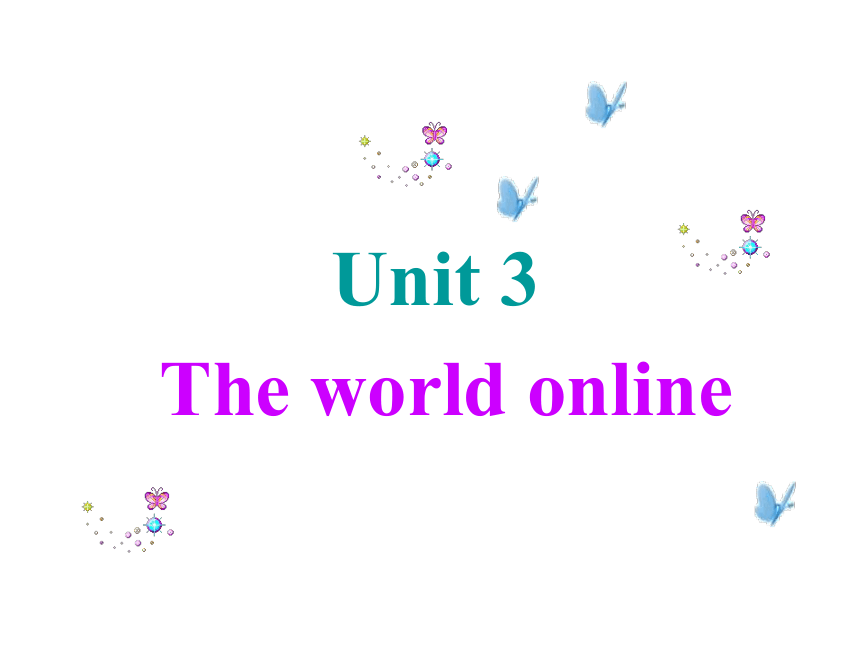 | |
| 格式 | rar | ||
| 文件大小 | 1.4MB | ||
| 资源类型 | 教案 | ||
| 版本资源 | 牛津译林版 | ||
| 科目 | 英语 | ||
| 更新时间 | 2011-05-05 21:38:00 | ||
图片预览


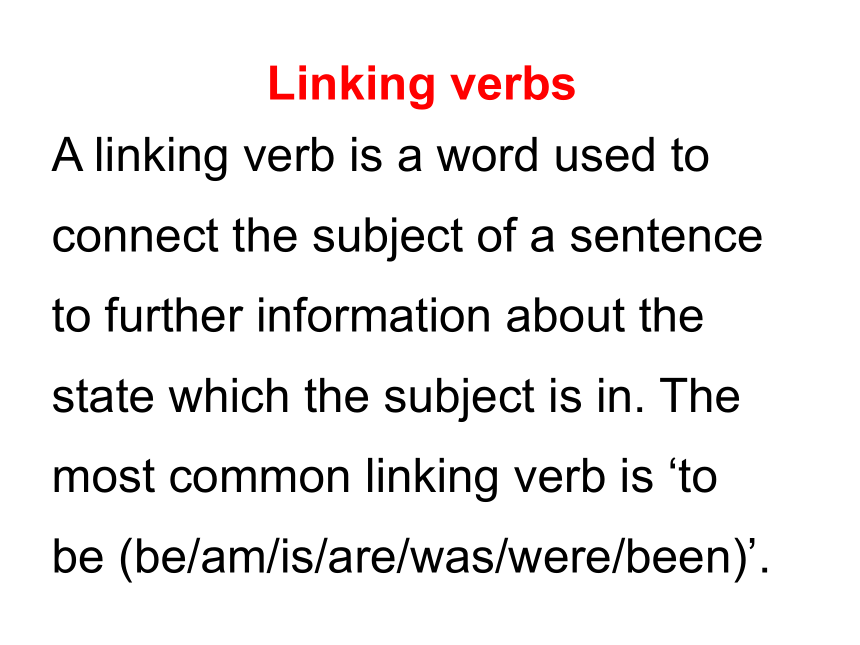
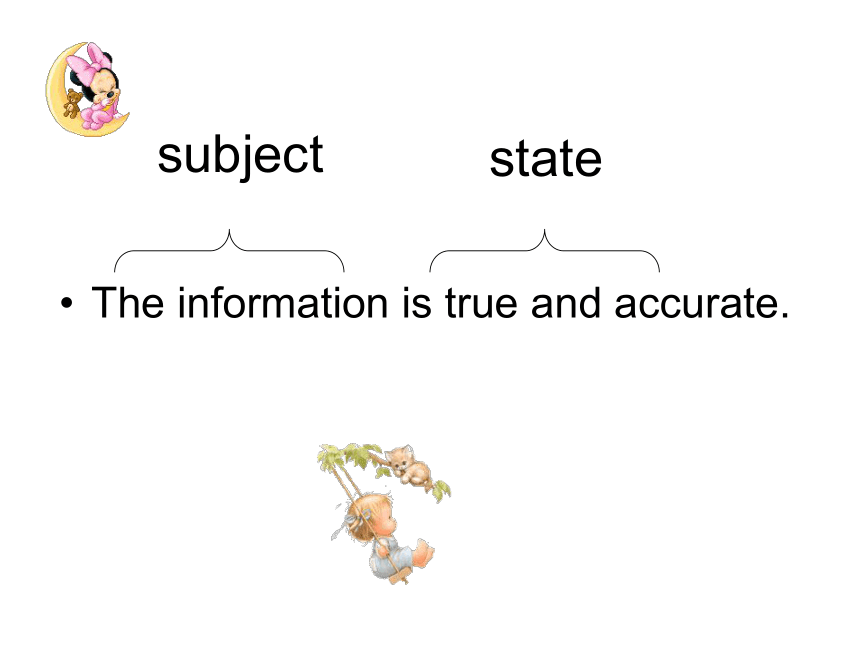
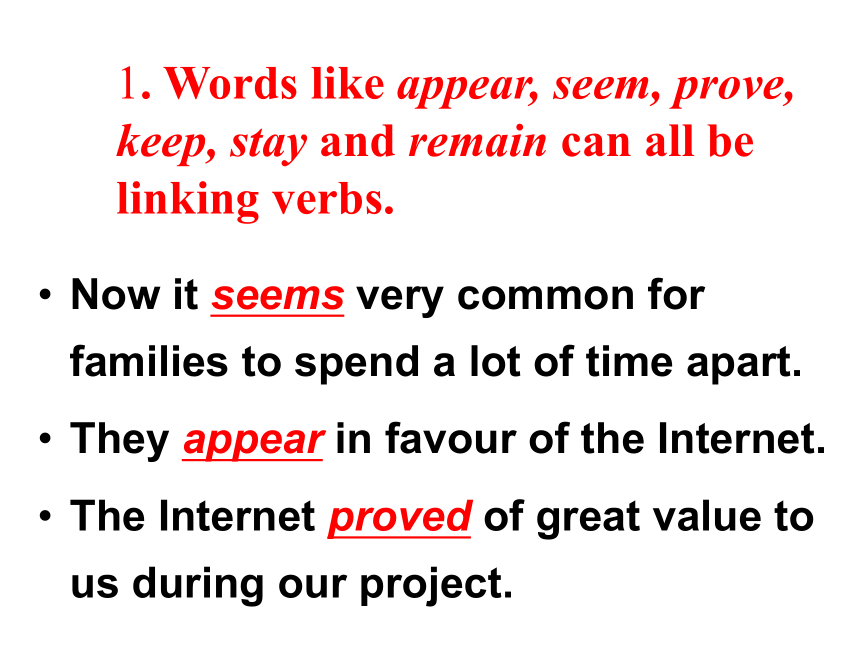
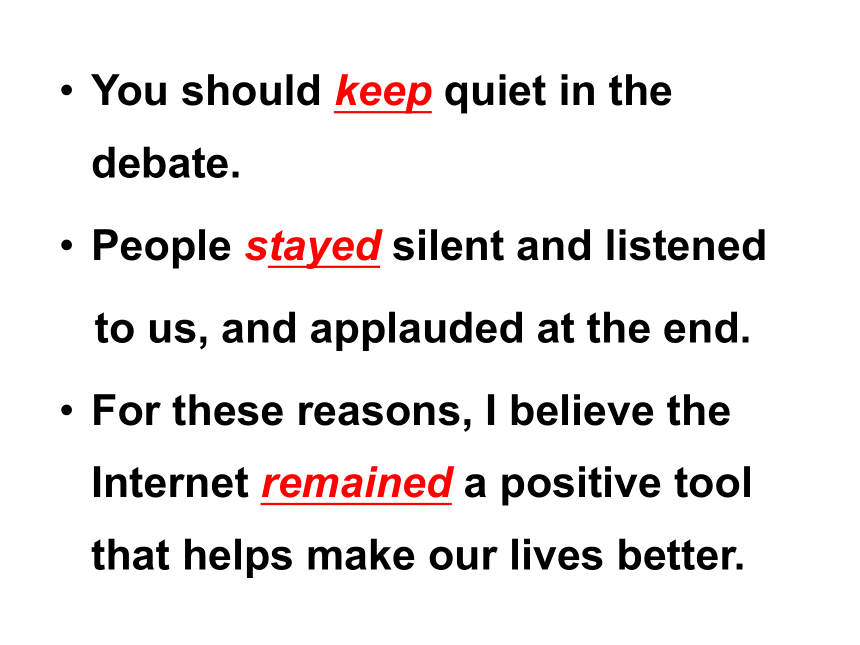
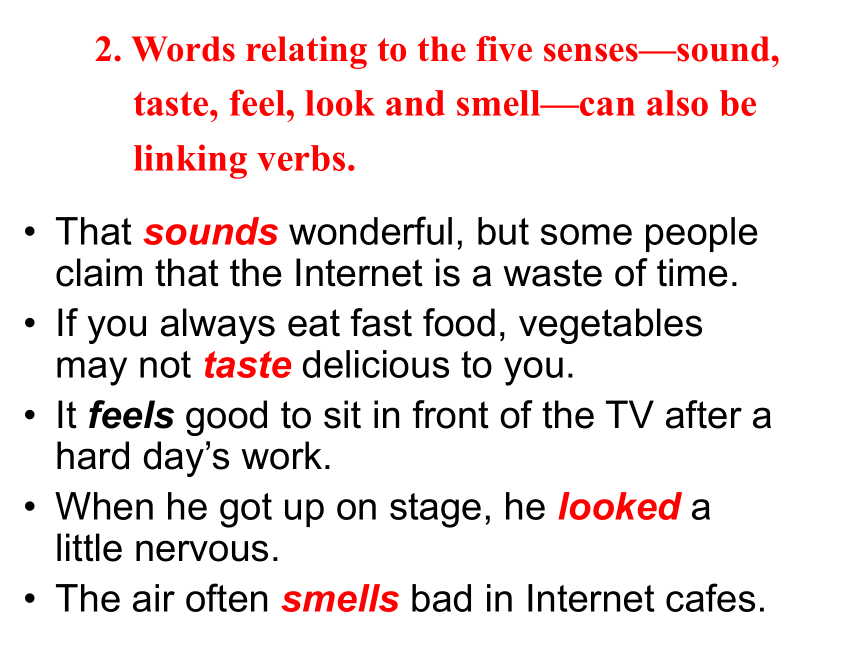
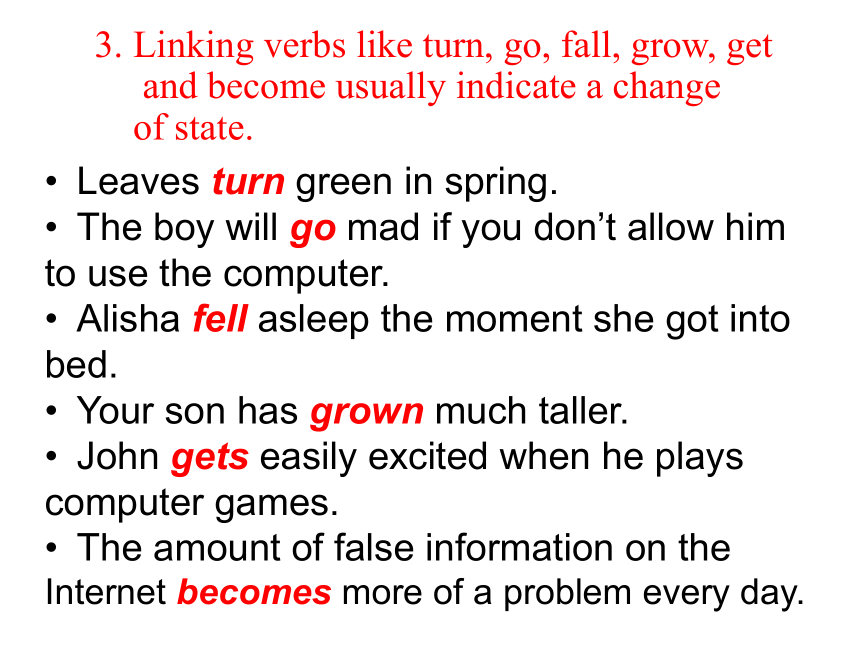
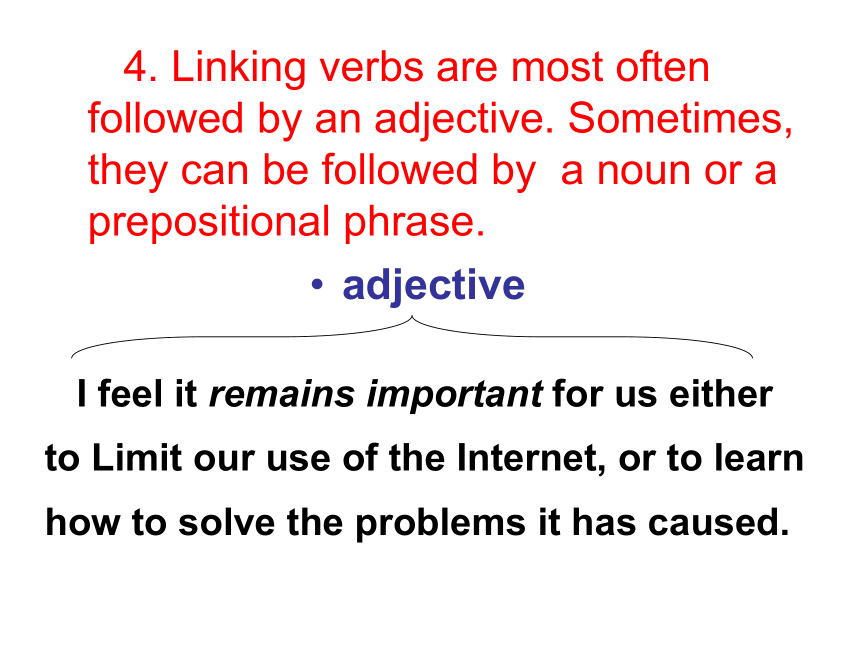
文档简介
(共23张PPT)
Unit 3
The world online
Grammar and usage
To study the usage of the linking verb.
A linking verb is a word used to connect the subject of a sentence
to further information about the
state which the subject is in. The most common linking verb is ‘to
be (be/am/is/are/was/were/been)’.
Linking verbs
subject
The information is true and accurate.
state
1. Words like appear, seem, prove, keep, stay and remain can all be linking verbs.
Now it seems very common for families to spend a lot of time apart.
They appear in favour of the Internet.
The Internet proved of great value to us during our project.
You should keep quiet in the debate.
People stayed silent and listened
to us, and applauded at the end.
For these reasons, I believe the Internet remained a positive tool that helps make our lives better.
2. Words relating to the five senses—sound,
taste, feel, look and smell—can also be
linking verbs.
That sounds wonderful, but some people claim that the Internet is a waste of time.
If you always eat fast food, vegetables may not taste delicious to you.
It feels good to sit in front of the TV after a hard day’s work.
When he got up on stage, he looked a little nervous.
The air often smells bad in Internet cafes.
3. Linking verbs like turn, go, fall, grow, get
and become usually indicate a change
of state.
Leaves turn green in spring.
The boy will go mad if you don’t allow him
to use the computer.
Alisha fell asleep the moment she got into
bed.
Your son has grown much taller.
John gets easily excited when he plays
computer games.
The amount of false information on the
Internet becomes more of a problem every day.
4. Linking verbs are most often
followed by an adjective. Sometimes,
they can be followed by a noun or a prepositional phrase.
adjective
I feel it remains important for us either
to Limit our use of the Internet, or to learn
how to solve the problems it has caused.
He became a teacher after graduating from college.
The article is about using the
Internet to help people of all ages.
Prepositional phrase
noun
Zhu Zhenfei is writing in her diary about
the Internet debate. She is learning about
the use of linking verbs. Help her underline
all the linking verbs.
18 March
Today I feel worn out. This morning, I took part in a debate about the Internet. The Internet is very controversial. It seems very popular with many people, but there are still some people who do not like it at all. They say that it is full of information that cannot be trusted, and that it stops people from spending time with their families and friends.
I admire the boy I debated against because he was very skilful. He made some quite reasonable points and gave a good speech. I talked to him after the debate. He seemed tired too. He doesn’t really think the Internet is bad, but he thinks we should pay attention to the problems it can cause. I agreed and told him I felt sure that if we use it in an intelligent manner, the Internet can be a good tool.
We were both happy with the
outcome of the debate. People stayed silent and listened to us, and applauded at the end. Mum predicts that I will become quite a good public speaker if I continue to take part in debates. I am hopeful that I will , and I am eager to debate again because today proved very successful!
Chen Lu writes for the school newspaper.
She interviewed some audience members
after the debate to get their opinions. Use
the linking verbs in the box to replace the underlined words. Write the new sentences
in the blanks below.
appeared remained stayed
seemed proved feel
1. The debate was quite interesting.
______________________________
2. Both speakers were very knowledgeable about the Internet.
______________________________
3. Now I am certain that information from the Internet cannot be trusted.
______________________________
4. Both speakers were very calm throughout the debate.
______________________________
5. It was exciting. Everyone was silent
until the very end.
______________________________
6. At the end, Zhu Zhenfei was confident that she had won.
______________________________
Language points
1. be popular with : liked, admired or enjoyed by sb.
某人所喜爱/赞赏或欢迎的
E.g.: I’m not very popular with the boss at the moment.
我现在不称老板的心.
2. Skilful adj. ~ at sth./doing sth. 熟练的
A ~ driver 熟练的司机
A ~ performance 娴熟的表演
The magician is so skillful with his hands that nobody can discover his secret.
Skilled adj.
1).熟练的,有能力的
~ workmen 熟练工人
2). 有经验的,需要技术性的
(置于名词前)
3. reasonable
1) 合理的,有道理的,理所当然的.
a ~ suggestion 合理的建议
2) 有理性的
Man is a ~ creature.
人类是理性的动物.
3) (价钱)合理的, 不贵的;合适的
(at) a ~ price 以合理的价格
reason n. & v.
beyond all ~ 毫无道理,莫名其妙
bring a person to ~ 使某人明白道理
by ~ of 因…的理由; 由于
for ~s of 因…的理由in ~合理的,正当的
It stands to ~ that… …是合理的
It stands to ~ that he felt uneasy.
他会觉得不安是理所当然的.
4.be happy with 对……满意的/满足的
She is not happy with her present position as a typist.
她对现在的打字员职位并不满意.
I’m not happy with your explanation.
我对你的解释不满意.
be happy about/at 高兴于……, 因……而感到高兴
She was happy about helping him with his
studies.
她很高兴能帮他搞研究.
5. eager more ~, most ~/~er, ~est
1) 渴望的, 殷切期望的
be ~ for /about sth. be ~ to do sth.
be ~ that…
E.g. He was ~ for success.
Tom was ~ for you to come to the party.
The president is ~ that the project (should )be started early.
总理热切希望这项计划能早日着手进行.
2) 热心的 an ~ student 用功的学生
He is very ~ in his studies. 他非常热衷于学业.
Keep the usage of the linking verbs
in mind.
Learn the phrases by heart.
Homework
Unit 3
The world online
Grammar and usage
To study the usage of the linking verb.
A linking verb is a word used to connect the subject of a sentence
to further information about the
state which the subject is in. The most common linking verb is ‘to
be (be/am/is/are/was/were/been)’.
Linking verbs
subject
The information is true and accurate.
state
1. Words like appear, seem, prove, keep, stay and remain can all be linking verbs.
Now it seems very common for families to spend a lot of time apart.
They appear in favour of the Internet.
The Internet proved of great value to us during our project.
You should keep quiet in the debate.
People stayed silent and listened
to us, and applauded at the end.
For these reasons, I believe the Internet remained a positive tool that helps make our lives better.
2. Words relating to the five senses—sound,
taste, feel, look and smell—can also be
linking verbs.
That sounds wonderful, but some people claim that the Internet is a waste of time.
If you always eat fast food, vegetables may not taste delicious to you.
It feels good to sit in front of the TV after a hard day’s work.
When he got up on stage, he looked a little nervous.
The air often smells bad in Internet cafes.
3. Linking verbs like turn, go, fall, grow, get
and become usually indicate a change
of state.
Leaves turn green in spring.
The boy will go mad if you don’t allow him
to use the computer.
Alisha fell asleep the moment she got into
bed.
Your son has grown much taller.
John gets easily excited when he plays
computer games.
The amount of false information on the
Internet becomes more of a problem every day.
4. Linking verbs are most often
followed by an adjective. Sometimes,
they can be followed by a noun or a prepositional phrase.
adjective
I feel it remains important for us either
to Limit our use of the Internet, or to learn
how to solve the problems it has caused.
He became a teacher after graduating from college.
The article is about using the
Internet to help people of all ages.
Prepositional phrase
noun
Zhu Zhenfei is writing in her diary about
the Internet debate. She is learning about
the use of linking verbs. Help her underline
all the linking verbs.
18 March
Today I feel worn out. This morning, I took part in a debate about the Internet. The Internet is very controversial. It seems very popular with many people, but there are still some people who do not like it at all. They say that it is full of information that cannot be trusted, and that it stops people from spending time with their families and friends.
I admire the boy I debated against because he was very skilful. He made some quite reasonable points and gave a good speech. I talked to him after the debate. He seemed tired too. He doesn’t really think the Internet is bad, but he thinks we should pay attention to the problems it can cause. I agreed and told him I felt sure that if we use it in an intelligent manner, the Internet can be a good tool.
We were both happy with the
outcome of the debate. People stayed silent and listened to us, and applauded at the end. Mum predicts that I will become quite a good public speaker if I continue to take part in debates. I am hopeful that I will , and I am eager to debate again because today proved very successful!
Chen Lu writes for the school newspaper.
She interviewed some audience members
after the debate to get their opinions. Use
the linking verbs in the box to replace the underlined words. Write the new sentences
in the blanks below.
appeared remained stayed
seemed proved feel
1. The debate was quite interesting.
______________________________
2. Both speakers were very knowledgeable about the Internet.
______________________________
3. Now I am certain that information from the Internet cannot be trusted.
______________________________
4. Both speakers were very calm throughout the debate.
______________________________
5. It was exciting. Everyone was silent
until the very end.
______________________________
6. At the end, Zhu Zhenfei was confident that she had won.
______________________________
Language points
1. be popular with : liked, admired or enjoyed by sb.
某人所喜爱/赞赏或欢迎的
E.g.: I’m not very popular with the boss at the moment.
我现在不称老板的心.
2. Skilful adj. ~ at sth./doing sth. 熟练的
A ~ driver 熟练的司机
A ~ performance 娴熟的表演
The magician is so skillful with his hands that nobody can discover his secret.
Skilled adj.
1).熟练的,有能力的
~ workmen 熟练工人
2). 有经验的,需要技术性的
(置于名词前)
3. reasonable
1) 合理的,有道理的,理所当然的.
a ~ suggestion 合理的建议
2) 有理性的
Man is a ~ creature.
人类是理性的动物.
3) (价钱)合理的, 不贵的;合适的
(at) a ~ price 以合理的价格
reason n. & v.
beyond all ~ 毫无道理,莫名其妙
bring a person to ~ 使某人明白道理
by ~ of 因…的理由; 由于
for ~s of 因…的理由in ~合理的,正当的
It stands to ~ that… …是合理的
It stands to ~ that he felt uneasy.
他会觉得不安是理所当然的.
4.be happy with 对……满意的/满足的
She is not happy with her present position as a typist.
她对现在的打字员职位并不满意.
I’m not happy with your explanation.
我对你的解释不满意.
be happy about/at 高兴于……, 因……而感到高兴
She was happy about helping him with his
studies.
她很高兴能帮他搞研究.
5. eager more ~, most ~/~er, ~est
1) 渴望的, 殷切期望的
be ~ for /about sth. be ~ to do sth.
be ~ that…
E.g. He was ~ for success.
Tom was ~ for you to come to the party.
The president is ~ that the project (should )be started early.
总理热切希望这项计划能早日着手进行.
2) 热心的 an ~ student 用功的学生
He is very ~ in his studies. 他非常热衷于学业.
Keep the usage of the linking verbs
in mind.
Learn the phrases by heart.
Homework
